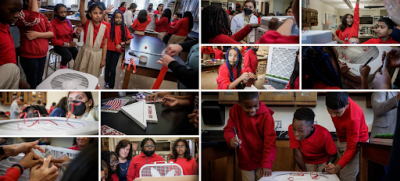 Noah Webster students’ hands-on science lesson is getting the attention of the White House! Recently, Marina Creed, a neuroimmunology nurse practitioner in the UConn Health Multiple Sclerosis Center and Dr. Kristina Wagstrom, associate professor of chemical and biomolecular engineering, taught a class on air pollution to Noah Webster fifth-graders. They helped the class make air filtration boxes, including one decorated to look like the White House itself. The filter was then delivered to President Joe Biden’s Office of Science and Technology Policy.
Noah Webster students’ hands-on science lesson is getting the attention of the White House! Recently, Marina Creed, a neuroimmunology nurse practitioner in the UConn Health Multiple Sclerosis Center and Dr. Kristina Wagstrom, associate professor of chemical and biomolecular engineering, taught a class on air pollution to Noah Webster fifth-graders. They helped the class make air filtration boxes, including one decorated to look like the White House itself. The filter was then delivered to President Joe Biden’s Office of Science and Technology Policy.
Author: Creed, Marina
DIY Air Filtration Systems Help Clear The Air in Connecticut Public Schools
 Gov. Ned Lamont announced last week that his administration will release $150 million to help upgrade heating, ventilation and air conditioning systems in Connecticut public schools to improve air filtration.
Gov. Ned Lamont announced last week that his administration will release $150 million to help upgrade heating, ventilation and air conditioning systems in Connecticut public schools to improve air filtration.
But medical staff and scientific researchers working on the University of Connecticut’s Indoor Air Quality Initiative say schools can improve the quality of their air with a $64 purchase at their local hardware store.
The program – led by Marina Creed, a nurse practitioner at the UConn Health Comprehensive MS Center – has already provided 200 so-called ‘Corsi-Rosenthal boxes’ to Coventry public schools, 100 to elementary school cafeterias in West Hartford, 10 at the Hartford Public Library and more at the South Park Inn Shelter in Hartford.
Read More @ CT News Junkie
Brian and Company With Marina Creed
Marina Creed, a neuroimmunology nurse practitioner in the UConn Health Multiple Sclerosis Center. Re: UConn students built an air purifier out of furnace filters, a fan and duct tape and it traps COVID-19 virus.
UConn’s Homemade Air Purifiers that Trap COVID-19, Make Cleaner Air Given to Classrooms
FARMINGTON, Conn. — A group of students from the University of Connecticut along with team members at UConn Health in Farmington built an air purifier out of furnace filters, a fan and tape.
It’s called the Corsi-Rosenthal box, and it traps the COVID-19 virus inside.
“It captures fine particular matter in the air about as fine as a commercial filter,” said Marina Creed, APRN of UConn Health’s MS Center.
It also captures dust, mold, pollen and, of course, viruses.
“We’ve found these are incredibly effective at lowering the levels of particles and these particles transmit infectious diseases like COVID and the flu in classrooms,” said Dr. Kristina Wagstrom from the UConn School of Engineering.
Read More @ Fox 61
White House’s Office of Science and Technology Policy Recognizes UConn’s Indoor Air Quality Initiative Fighting COVID-19
Story originally published on UConn Today
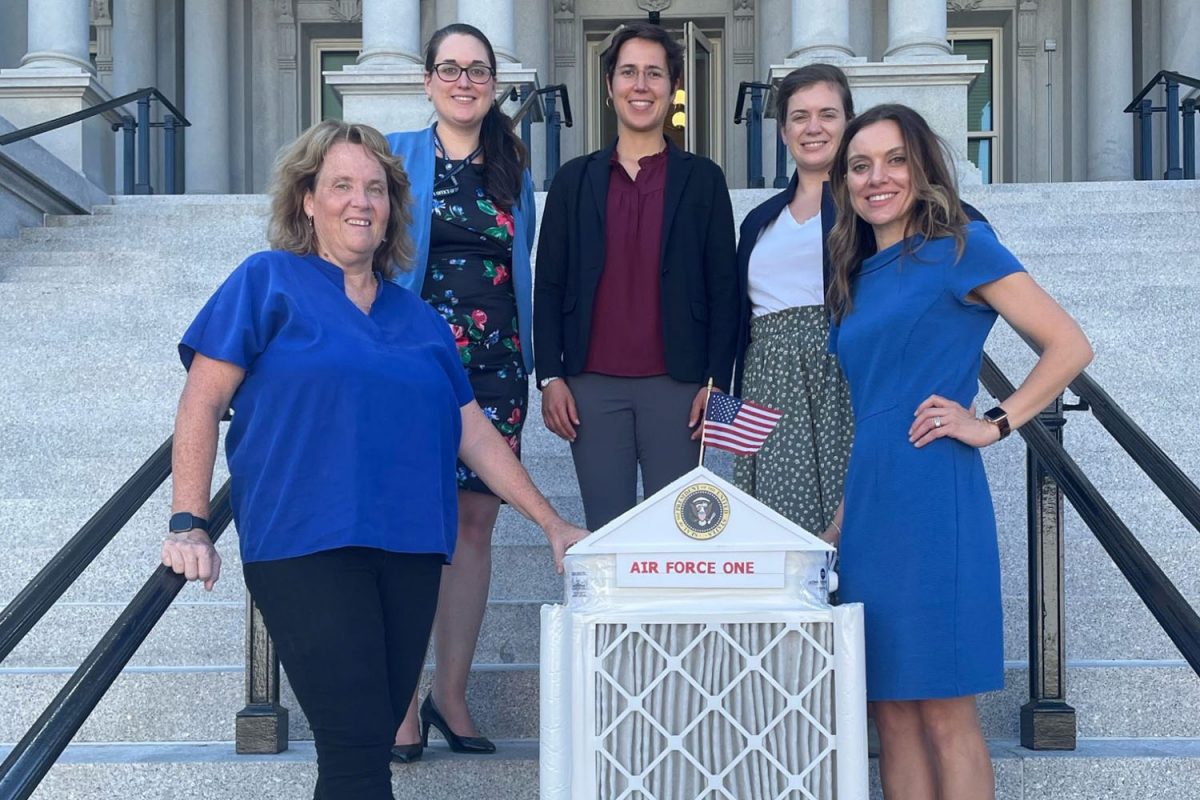
UConn Health nurse practitioner Marina Creed’s University of Connecticut cross-campus do-it-yourself indoor air purifier project continues to gain momentum — all the way to the White House.
Creed’s patients in UConn Health’s Multiple Sclerosis Center are among the more vulnerable to severe illness from COVID-19. Motivated by her role as both a clinician and a parent, last year she initiated a cross-campus public health initiative to get what are known as “Corsi-Rosenthal Boxes” into public school classrooms.
The boxes are an uncomplicated combination of easily obtained supplies that can be assembled in minutes. The components — a box fan, pleated air filter panels, cardboard and duct tape — add up to less than it costs to travel to Washington, D.C., where Creed presented members of the Biden administration’s Office of Science and Technology Policy (OSTP) a DIY air purifier by the UConn team and Hartford school children.
On September 9 she and UConn School of Engineering’s Associate Professor in Chemical and Biomolecular Engineering Kristina Wagstrom visited a fifth-grade science class at Hartford’s Noah Webster Microsociety Magnet School, where they presented a STEM lesson that included the assembly of two DIY purifiers.
One, decorated in the school’s color, red, stayed in the classroom; the other, decorated as “Air Force One” and signed by the class, would be on its way to the White House the next day.
“It was an incredible opportunity for our team to showcase this important intervention made by Hartford public school students to the Office of Science and Technology Policy and gift ‘Air Force One’ to the team within the executive office of the president,” Creed says. “It was wonderful to see the children’s STEM lesson come to life. The unit is inside the Eisenhower Executive Office Building, and we hope it will make its way into the West Wing for the president and first lady to appreciate.”
The DIY air filtration kits have been shown to be comparable to manufactured portable HEPA filters.
“It was great to see how excited the students were to work on something that would have real impact,” Wagstrom says.
Creed says their UConn team’s research includes using state-of-the-art cloud-based air quality monitoring sensors to capture critical data showing the intervention’s effectiveness in improving indoor air quality in real-world settings. The sensors, called MODULAIR-PM, are provided by Quant-AQ, an air quality startup in Somerville, Massachusetts.
“The evidence is clear – clean indoor air keeps students healthier and happier. We are excited to learn more about how these students put this evidence into action to benefit their community,” said Dr. Erica Kimmerling, Senior Advisor for Public Engagement at the White House Office of Science and Technology Policy. “The ‘Air Force One’ air filter will not only help provide clean air to the staff at the White House Office of Science and Technology Policy but it will be a great conversation starter to help spread the word about the ways people can improve indoor air quality.”
Creed was honored to be gifting the device to the White House OSTP alongside a major advocate of the DIY Corsi-Rosenthal intervention, Kimberly Prather, Distinguished Professor of Atmospheric Chemistry at University of California San Diego (UCSD) and the Scripps Institute of Oceanography. Members of President Biden’s OSTP accepting the gift were Kimmerling, Dr. Georgia Lagoudas, senior advisor for biotechnology and biodefense, and Dr. Stephanie Guerra, assistant director for national security and biodefense.
In the spring, the Office of Science and Technology Policy held a webinar titled “Clear the Air of COVID-19.” Creed emailed the office to explain her indoor air filtration project, and in reply received an invitation to give a 30-minute briefing. As a capstone to the briefing, Creed, whose hometown is Washington, D.C., offered to bring a box made in the community by school children. The response to that was an invitation for a formal delivery to the White House.
“I was humbled that our work is being noticed at the federal level, and I am eager that our project will result in widespread improvements in public health through low-technology, low-cost, energy-efficient STEM projects that fifth grade school children can do,” Creed says. “It was heartwarming to know that a private citizen like myself can take an idea inspired by direct patient care and continue to push for the fruition of the vision that I have had, which is that these should be in every classroom in the state of Connecticut, if not throughout the country. It felt great to know that there’s federal support behind this initiative that we are working on.”
Support isn’t only coming from the federal government. In August the UConn Foundation announced a $300,000 grant funded through cryptocurrency from Balvi, an investment and direct giving fund established by Vitalik Buterin, the co-creator of Ethereum, to back the Indoor Air Quality Initiative. In May, Creed was recognized with one of UConn’s 2022 Provost’s Awards for Excellence in Community Engaged Scholarship.
The filtration systems are named for their creators, Richard Corsi, dean of engineering at the University of California-Davis, and Jim Rosenthal, CEO of Texas-based company Tex-Air Filters. Since last year Creed has been working to get them into Connecticut schools, and to teach students how to make them as part of a science and health lesson.
The students who helped create ‘Air Force One’ at the Webster Magnet School were impressed.
“We made an air filter that can help take away the germs and bacteria, and it’s really useful because a lot of kids got COVID now and earlier in the year,” says Elijah Ruiz, 10, of New Britain.
“It’s really cool that you can just get a few items that only cost a couple of dollars and make something that can make such a difference,” says Mia Lee, 10, of Manchester.
“It’s something that could be life-changing for everybody, and it can cure a lot of diseases, like COVID,” says Nayeli Rockwell, 10, of East Hartford.
What about the idea that something they helped make and put their names on would be going to the White House?
“Out of this world,” Nayeli says.
“That’s crazy,” Elijah says.
“It’s really, really cool, because Joe Biden is our president,” Mia says.
The Indoor Air Quality Initiative’s UConn cross-campus collaborators include: UConn Health and its Comprehensive Multiple Sclerosis Center, UConn School of Medicine and its Department of Public Health Sciences, UConn School of Engineering, UConn School of Nursing, Connecticut Area Health Education Center Network (CT AHEC), and the UConn Neag School of Education.
Twitter Update Courtesy of the Office of Science and Technology Policy
And #teamOSTP was excited to receive a Corsi–Rosenthal box from Noah Webster MicroSociety Magnet School students. These inexpensive, DIY cubes help to clean indoor air, improving cognition and health. “Air Force One,” indeed! Thanks @NWMMSHartford! https://t.co/CBEJTmauwY
— Alondra Nelson (@AlondraNelson46) September 10, 2022
UConn Indoor Air Quality Initiative, Funded Through Cryptocurrency, Works to Protect Schools from Spread of COVID-19
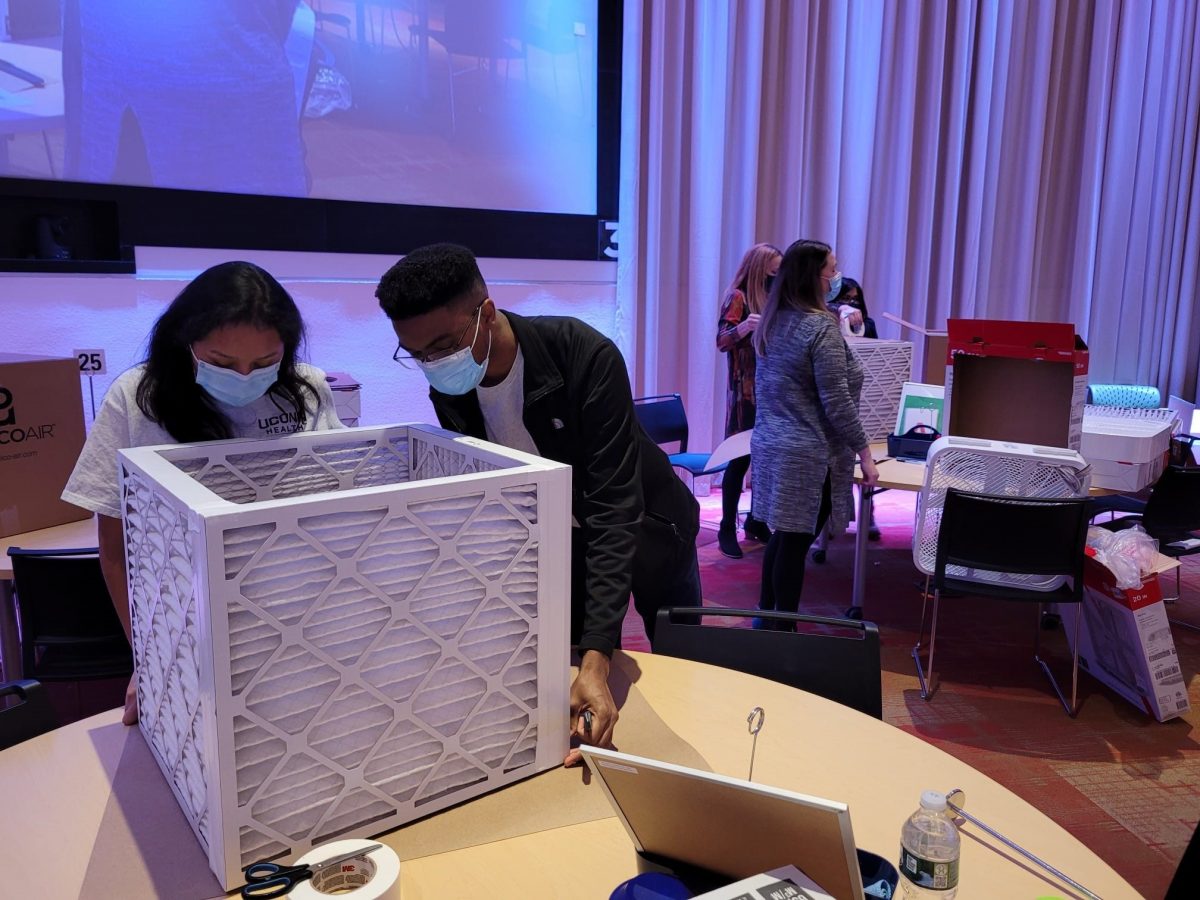 COVID-19 cases may be falling, but the virus is still a very real concern for many parents sending their children back to school. UConn researchers are working to ease those worries by building do-it-yourself air purifiers to improve health in schools and other crowded settings. The Indoor Air Quality Initiative, which has already made an impact in Connecticut, is growing, thanks to a generous donation.
COVID-19 cases may be falling, but the virus is still a very real concern for many parents sending their children back to school. UConn researchers are working to ease those worries by building do-it-yourself air purifiers to improve health in schools and other crowded settings. The Indoor Air Quality Initiative, which has already made an impact in Connecticut, is growing, thanks to a generous donation.
The initiative has received a $300,000 grant, funded through cryptocurrency, from Balvi, an investment and direct giving fund established by Vitalik Buterin, the co-creator of Ethereum. Ethereum is a technology for building computer applications and organizations, holding assets, transacting, and communicating without being controlled by a central authority. Balvi was established for the purpose of deploying funds quickly to high-value COVID-19 projects that traditional institutional or commercial funding sources tend to overlook.
“Improving the quality of indoor air is a key tool for dealing with covid and future pandemics without any disruption to normal life,” says Buterin. “We are excited to support grassroots initiatives to improve air quality in schools and other public venues.”
The donation will allow UConn to expand the project’s reach and add to the more than 400 purifiers already in schools, libraries, shelters, and other locations throughout the state.
A Viral Sensation
 When Dr. Richard Corsi floated an idea on Twitter for a highly effective, inexpensive, DIY air purifier to help lower the risk of Covid, his light-bulb moment went viral in the best possible way. Now many of America’s top scientists—and even the White House—are touting the invention, and people all over the planet are thinking inside the box.
When Dr. Richard Corsi floated an idea on Twitter for a highly effective, inexpensive, DIY air purifier to help lower the risk of Covid, his light-bulb moment went viral in the best possible way. Now many of America’s top scientists—and even the White House—are touting the invention, and people all over the planet are thinking inside the box.
This story started, as so many do, with something small. In this case, magnitudes smaller than the period at the end of this sentence—a tiny droplet carrying the SARS CoV-2 virus.
It all began on Jan. 20, 2020, when environmental engineer and air quality expert Dr. Richard Corsi, the man at the center of this particular story, tweeted out a BBC article about a “new virus in China” that by that point had led to only two confirmed deaths. But Corsi could read between the lines and commented on the news with these five prescient words: “This deserves the world’s attention.”
By February, concerned that the virus could be airborne, Corsi dropped his routine of going to the gym six days a week and stopped taking public transportation.
The story got bigger from there—much bigger.
A lifelong academic specializing in air quality, Corsi was especially concerned about the ability of cash-strapped schools to protect their students and faculty. In July, as students prepared to return to school, his concern grew considerably, and he tweeted: “Public K-12 schools serve as a place to work or learn for more than 15% of the total population of the United States each year. IMHO, they are THE critical ‘business’ to watch during re-opening in the fall. I’ve worked w/ many school districts and know how resource-constrained they are and, in many cases, strained in terms of facilities staff. This gives me gr8 concern. If not done right the educational, health & econ impacts could be devastation on top of current devastation.”
This DIY box helps clear indoor air of the coronavirus. Why aren’t more people using them?
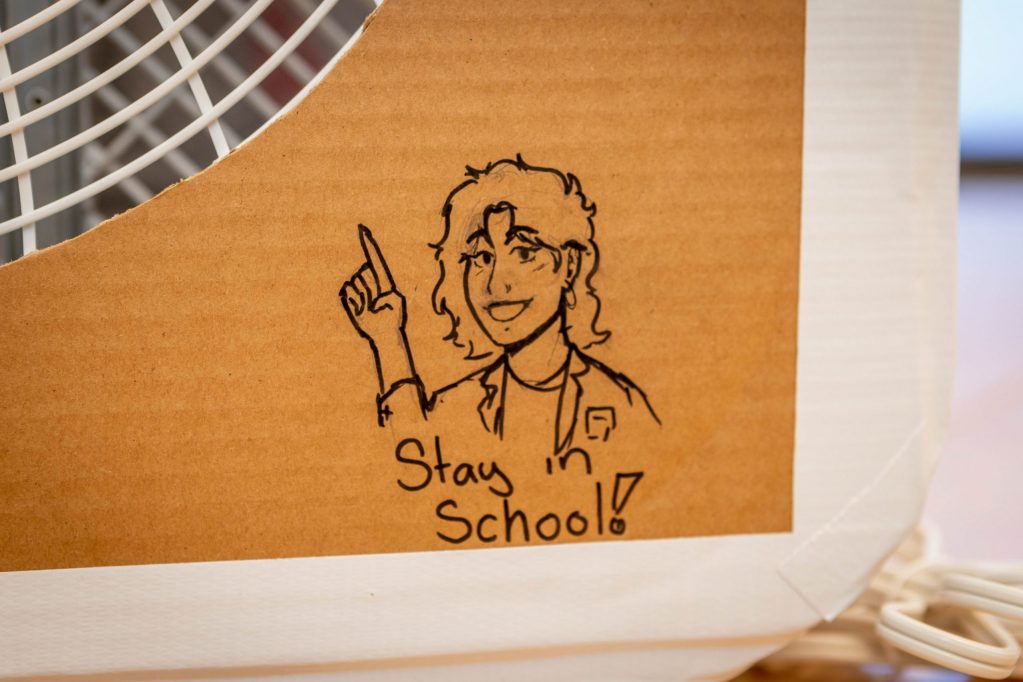
The glowing box, pulsing with rainbowy light, looks as if it was dropped into this Studio City living room from a warehouse rave.
It came, in fact, from the garage where Alex LeVine has been tinkering with fans, filters and tape, trying to bring a bit of fun to a simple tool to prevent the spread of COVID-19. The mesmerizing device uses fans and filters to pull contaminants — including smoke, dog dander and the unwelcome coronavirus — out of indoor air.
It can also flash in time to the sounds of Phil Collins. “In the Air Tonight,” of course.
“People aren’t embracing any of the other things that can avert disaster in this pandemic,” said LeVine, a 49-year-old cannabis company executive with an electrical engineering degree who started building trippy do-it-yourself filtration boxes as a hobby. “Maybe I can create a way to clean the air that people want in the middle of the room.”
Read Me @ The LA Times
Community Engagement Awards Recognize Faculty, Staff, and Students
Story originally published on UConn Today
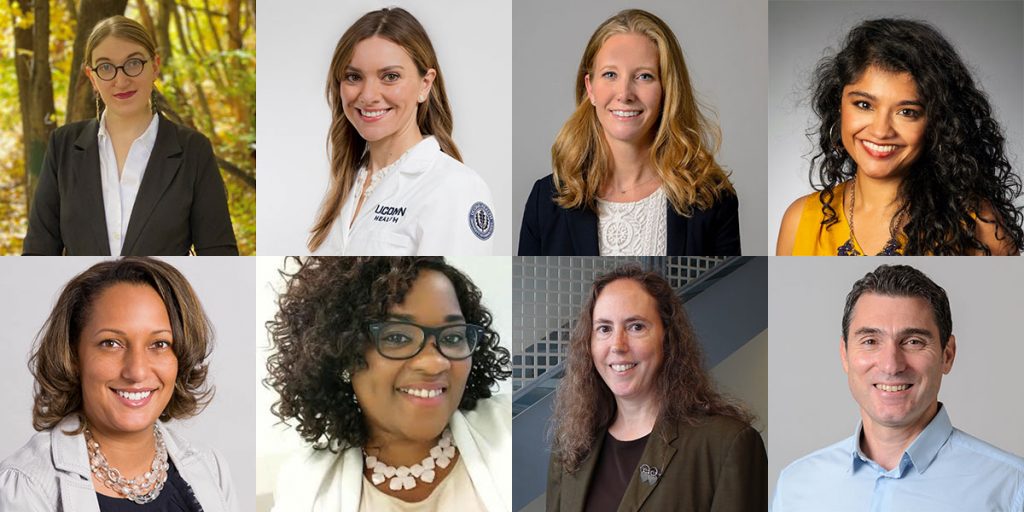
Several UConn faculty, staff, and students are being honored for their work benefitting citizens and communities as recipients of the annual Provost’s Awards for Excellence in Community Engaged Scholarship.
The awards recognize scholarly activities led by members of the UConn community that are in collaboration with local, regional/state, national, or global communities to create conditions for the public good, culminating in sustainable change and dissemination of these activities. These activities integrate community service with research, creative work, and teaching.
The awardees for 2022 are as follows:
Staff, Emerging: Marina Creed
Marina A. Creed is a Family Nurse Practitioner at the Multiple Sclerosis Center within the Department of Neurology at UConn Health. Creed was nominated for her cross-campus UConn Indoor Air Quality Initiative efforts to protect her patients and surrounding communities during the COVID-19 pandemic, including spearheading an interventional public health initiative spanning UConn Health and UConn’s Schools of Medicine, Nursing, and Engineering. The initiative’s goal is to improve indoor air quality in the community and reduce the transmission of COVID-19. Creed became the integral force behind getting 400 “Corsi-Rosenthal Boxes” into public school districts and vulnerable community locations. These low-cost, do-it-yourself air purifiers have been used in other places around the country but are just emerging to reduce indoor air contaminants, including SARS-CoV-2 viral particles, in situations in which more expensive changes to ventilation are either impossible or will take years to implement. Hundreds of these air purifiers have also been built and donated to Coventry, Hartford, and West Hartford Public Schools, as well as to local homeless shelters, medical clinics, and public libraries. Her efforts have helped many schools become safer and she is working with team behind the initiative to quantify the intervention’s impact on air quality in the pilot school districts, and build a public-facing website to teach communities how to build the unit through a STEM lesson plan for K-12 schools.